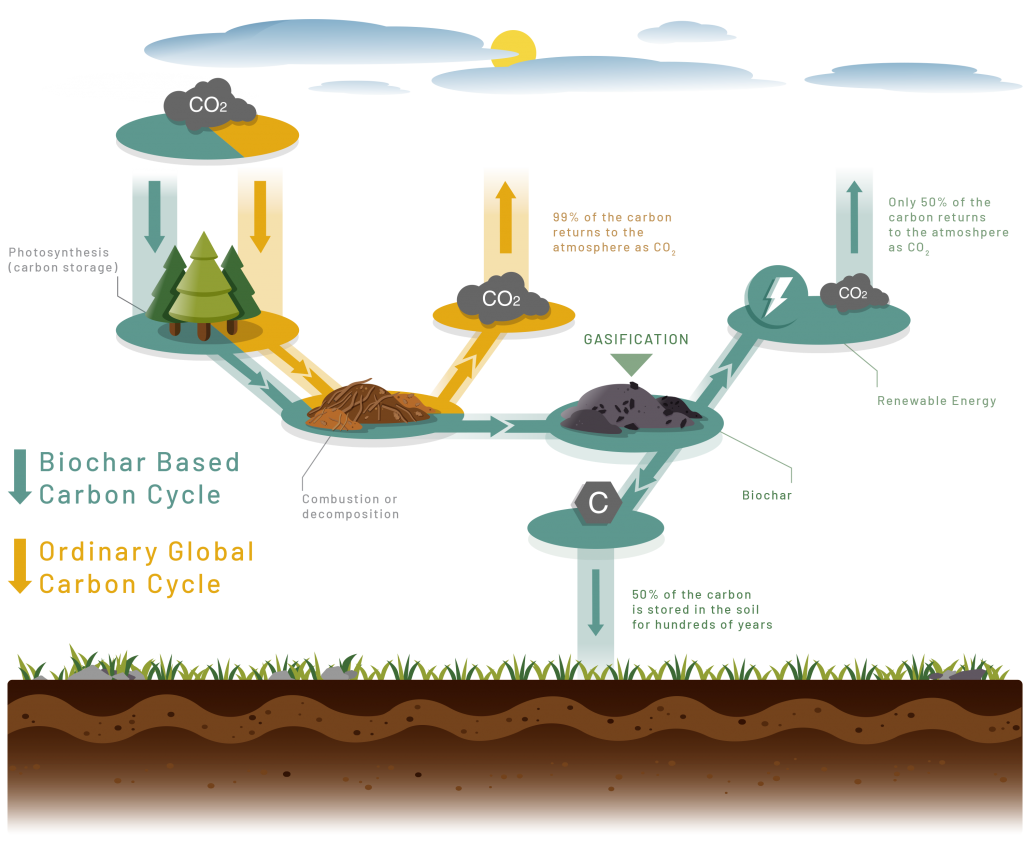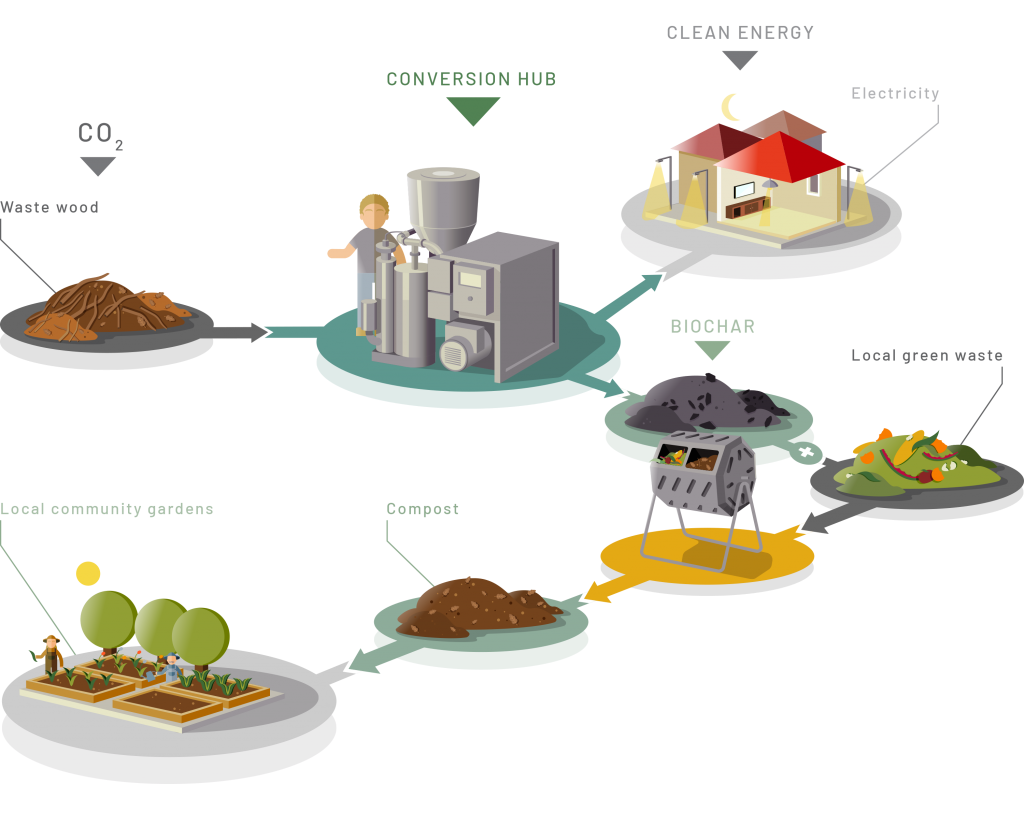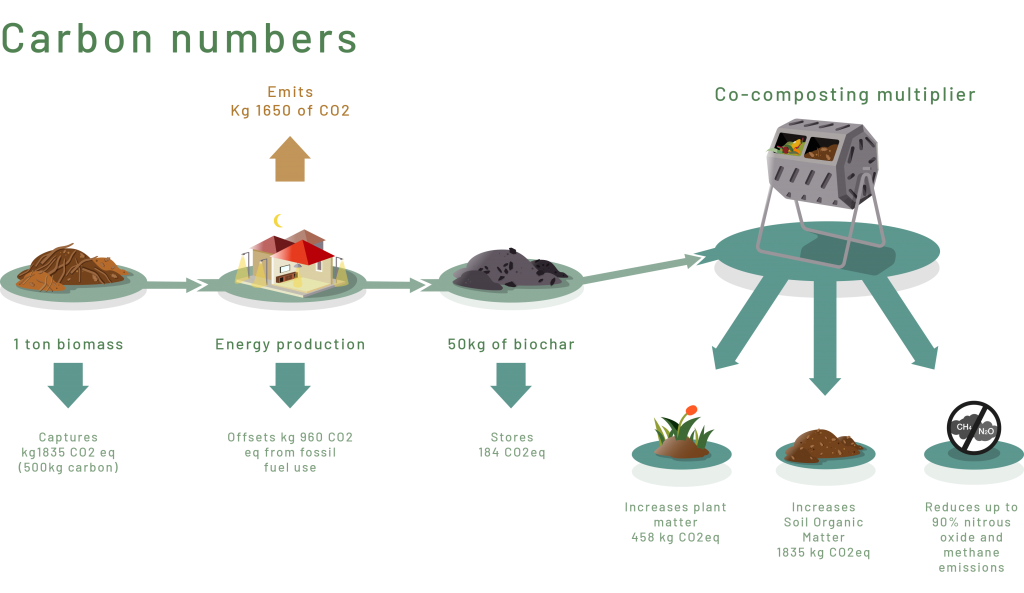LCN has sequestered
Equivalent to approximately 103 acres of forest in one year, with projects currently spanning across 36 households and 11 community gardens
How Are We Doing This?
By bringing together plants, people and machines for an immediately actionable and scalable drawdown solution
The Local Carbon Network is a community based carbon management system which closes the carbon cycle by transforming local green-waste into renewable energy, with long term sequestration of carbon in the soil as Biochar.
Home composters, supporting the project with yearly subscriptions, allow for local community gardens to receive sponsored biochar and the whole Network to grow, with potential for 10-40ppm CO2e climate impact over the next century. Here is how.
Plants use CO2 during photosynthesis and their structure is rich in carbon. When they die they decompose or burn, releasing methane or carbon dioxide back into the atmosphere.
We can stop the process and keep the carbon in the ground by transforming waste wood into charcoal or Biochar. Added to your kitchen scraps in a compost bin a “super-compost” is obtained for regenerative agriculture and carbon farming. Wherever plants grow worldwide this method can be easily applied.
With this innovative process waste wood is no longer hauled off to the landfills. Renewable electricity and heat are also generated in the process. The natural carbon cycle releases 99% of the carbon back into the air but with Biochar production we can store in the ground 50% of plant carbon.

Biochar is fabulous!
It boosts the electron exchange capacity of the microorganisms in your compost pile
Whereas all biochars are great to use, it’s only the high temperature biochars that are conductive. This means the microorganisms are more active, the compost piles are hotter and the whole composting process is faster. This is just one of the many benefits that biochar brings to your garden.
Biochar greatly reduces the odor and emissions from the pile and when in the soil holds nitrates while decreasing the need for fertilizers. It also holds water in the soil for longer, enhances mycorrhization and increases the immune response in plants.
What is a Local Carbon Network?
Composting and drawdown at a community level
The LCN project acts like a social impact enterprise. We reinvest the resources obtained from the home tumbler/biochar sales and subscriptions, as well as sponsor donations, to support biochar composting at our local community gardens.
Aside from our main scope, which is Carbon Drawdown we also enable Regenerative Agriculture, Education and Circular Economy within the community, together these form the 4 pillars of our mission.
We support regenerative agriculture by providing the biochar together with the know-how on how to make truly regenerative compost that is balanced in fungi, bacteria, microorganisms and minerals.
We educate by providing free gardening resources and collaborating with local educational facilities
We support circular economy and community by repurposing local waste into useful gardening products and as well as promoting the products and events of the community gardens that form our networks.

The Climate Clock tells us we will reach our CO2 limit within 11 years. The Scientific American tells us we only have 60 harvests left but it’s not too late.
Professor Rattan Lal from Ohio State University says that “a mere 2% increase in the carbon content of the planet’s soils could offset 100% of all greenhouse gas emissions going into the atmosphere.” … while also regenerating soils.
That is why Biochar production and use is so important and is being endorsed by the IPCC and EPIC Institute.
Why does it work?
Because we create a win win scenario for green waste recycling projects, for community gardens and for the environment.
Each kg of Biochar has a carbon impact of 20-40 kg of CO2e. In comparison a tree absorbs 20kg of CO2 in a year so using tons of biochar is equivalent to planting acres of forest. All the details are on the benefits page and for scientific evidence please see our white paper or list of studies.
You can get involved by supporting the project via a sponsorship or a subscription, by volunteering in your local community garden or by producing Biochar.



